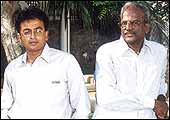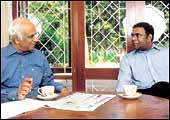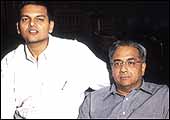 |
A.C. MUTHIAH (L) WITH
ASHWIN MUTHIAH
Ashwin will have to reduce SPIC's investment in associate companies.
He will also have to restructure the company's crippling debt. |
These
days, N. Sankar has taken to lingering over the breakfast table.
There is, after all, no need for the 56-year-old chairman of Chemplast
Sanmar to rush off to work at 8.30 every am; his son Vijay Sankar
is there to run the show.
Another chairman of a Chennai-based company,
V.L. Dutt (the company is engineering major KCP) recently took off
to Vietnam to visit a sugar factory managed by his company. In his
absence, his wife Indira and daughter, Kavitha Chitturi, managed
the company. Increasingly, says Dutt, he finds himself delegating
more responsibility to his 30-year-old daughter. ''I am here purely
in an advisory capacity and hope they don't throw me out.''
And yet another chairman of a Chennai company
is preparing for retirement. K. Mahesh of Sundaram Brake Linings,
the second Indian company to win the Deming award, would have done
so earlier. Only, his son Krishna Mahesh insisting on working outside
the 'family business' (with McKinsey and Toyota, for those obsessed
with details) before coming back into the fold. Now that he has
signalled his readiness to do so, Mahesh Sr. is hanging up his boots.
There are more instances of the kind (See Succession,
Southern Style). All have happened in the past year; some are common
knowledge; others aren't; and all successions have been remarkably
quiet. Some companies may have held press conferences to announce
the event. Others may have hired pr pros to net airtime on business
channels or column CMS in the business press. But they do things
differently down south.
It hasn't been a happy beginning for some of
the young successors. A few have inherited once-thriving business
empires that haven't really managed to use a decade of reforms to
their advantage. Others have taken charge of companies that are
caught in a limbo of sorts: they are big enough to attract attention
of predators and competitors, yet small enough not to enjoy the
benefits of scale. And still others are just victims of timing-the
slowdown has taken its toll on their companies.
 |
C. SATHYAN (L) WITH
R.G. CHANDRAMOGAN
Sathyan is exploring the posibility of making Hatsun a national
player in the milk business and launching value-added offerings. |
Making Sense Of It All
SPIC and Chemplast Sanmar are amongst those
companies that got left behind in the decade of reforms. ''We are
still a Rs 1,200-crore group, while we should be Rs 6,000 crore,
but we did not possess the skills to deal with the environment,''
rues Sankar. But Vijay Sankar can't really think in terms of growth
right away. With over 24 companies in the group's portfolio, his
immediate concern is consolidation. The Sanmar group does have a
corpus of professional managers running the show-Sankar counts this
among his achievements-and Vijay's primary responsibility is to
work with them and worry about the investments. ''I am happy being
an investor and will focus on my investments paying back.''
Vijay Sankar can get along by playing investor;
Ashwin Muthiah can't. The 36-year-old Vice Chairman and CEO of the
conglomerate assumed that charge barely six months ago. SPIC started
life as a profitable fertiliser company, but unrelated diversifications-most
failed-have wreaked havoc on its financials. Expectedly, its own
performance suffered. In 2001, SPIC boasted a turnover of over Rs
2,000 crore but profits of a mere Rs 15 crore. The other companies
of the M.A. Chidambaram Group fared better: a turnover of Rs 1,475
crore and profits of Rs 172 crore.
And so Ashwin Muthiah has had to stop pursuing
his interests in polo and golf, and devote attention to SPIC. First
up, he plans to get rid of the company's unprofitable investments-some
Rs 800-odd crore in associate companies. Then, he plans to restructure
SPIC's debt (interest costs alone added up to Rs 210 crore in 2001):
to do this Muthiah Jr. will have to resolve the fate of SPIC Petrochemicals
a Rs 1,300-crore initiative to make PTA, PFY, and SPIC Fertilisers
and Chemicals Fze, a fertiliser company located in Dubai's Jebel
Ali Free Trade Zone, neither of which has taken off.
That's an impressive agenda. Can Ashwin Muthiah
do it? He thinks he can, but says it will take at least three years.
 |
N. VENKATRAMANI (L)
WITH RAM
Ram would like to see IP leverage its association with Federal
Mogul to become a global player. To this end, he's extending
the company's expertise to design and software. |
Building On A Sound Base
The auto component makers who feature in this
story-Sundaram Brake Linings, India Pistons, and Wheels India-are
in better shape. India Pistons is lower than low profile: it is
part of the closely-held Amalgamations Group and not many are aware
that management guru C.K. Prahalad began his career in the company.
India Pistons is managed by N. Venkatramani, widely recognised as
the technical brain behind the group-he is married to Sita, the
sister of Amalgamations Chairman A. Sivasailam-and a hands-on manager.
It is also, increasingly, managed by his sons. The elder, Anantharamakrishnan
(Ram for short and named after the group's founder) is 34, currently
designated Executive Director and looks after operations and quality.
The younger, Gautam is 27 and heads marketing.
India Pistons is among India's largest piston
manufacturers, but it operates in an industry characterised by shrinking
profit margins. Worse, the threat of competition from cheaper imports
looms large. The company has global aspirations, and Ram would like
to see them realised. The key to this could be its ability to leverage
its association with Federal Mogul, a global auto component major
and supply pistons to all of the latter's 50 plants in all parts
of the world. To this end, says Ram, ''We are willing to take care
of design and software development.''
India Pistons may have been a dasher in the
1970s-it was among the first companies to induct management trainees-but
it is widely perceived as a non-aggressive marketer. ''I am changing
that image,'' says Gautam. Still, the challenge lies as much within
the company as it does without. ''They may have got a head start,''
says Venkatramani referring to his sons, ''but they still have to
prove themselves.''
 |
N. SANKAR (R) WITH VIJAY
With over 24 companies in the group's portfolio, Vijay Sankar's
immediate concern is consolidation. He is happy being an investor
and wants to focus on his investment paying back. |
That sentiment is echoed by SBL's K. Mahesh.
''My son will have to face my managers and establish himself''.
That shouldn't bother Krishna Mahesh who has cut his teeth at McKinsey
and Toyota. And fact is, he inherits a company on a high: SBL has
just won the Deming award and it does have the operational bandwidth
to cope with imports. Still, the younger Mahesh (for the benefit
of those unfamiliar with South Indian names, his first name his
Krishna, his father's, Mahesh) is aware that the company needs to
address several concerns. He lays these out like a blue-blooded
consultant: one, SBL needs to have a clear strategy that leverages
its continually improving operational capability to compete with
entrenched incumbents (much like Toyota did in a number of countries,
he adds); two, it needs to have in place capabilities (people and
R&D) to confront long-term challenges including product diversification;
and three, as the global auto industry switches from mechanical
systems to electronic systems, SBL needs to have products that serve
as the analogue of the current brake lining.
Learning On The Job
If Krishna Mahesh spent time in other companies
picking up relevant experience, C. Sathyan did so by beginning early.
The 24-year-old has just been named Executive Director of Hatsun
Agro Products, but he has been part of business decisions of the
Rs 215 crore company founded by his father R.G. Chandramogan since
he was 12. Hatsun, for the uninitiated, owns the Arun brand of ice
creams that is the market leader in several parts of southern India,
and is the largest dairy corporate (it processes 4.5 lakh tonnes
of milk a day). Hatsun's rise has been nothing short of meteoric-its
turnover was a mere Rs 35 crore in 1997-and that, paradoxical as
it may sound, makes things difficult for Sathyan. ''We cannot afford
to make mistakes,'' says Sathyan. ''There's too heavy a price to
pay (if we do)''. Rs 200-odd crore is an awkward size and Sathyan
and his father realise it. The former is studying the northern and
western markets and plans to make Hatsun a national player in the
milk business.
It'll be difficult, but at least he has to
cope with a growing company, unlike KCP's Kavitha D. Chitturi who
has to manage a company affected by the recession. The year 2000
may have been the only year KCP suffered losses, but like most other
engineering companies, it too has borne the brunt of the recession.
Worse, in 1996, the company divested its sugar business in favour
of a member of the extended Dutt family, and this resulted in an
erosion (by around 50 per cent) in its revenues. Today, KCP is an
engineering conglomerate with interests in cement and software (ERP
solutions for sugar, cement, and engineering industries). And Chitturi
manages the company's human resources department and is looking
for growth opportunities. ''We will stick to the existing businesses,''
she says, ''and the technology venture will just add value to that,
but I would like to see us getting into biotech again (the company
had a joint venture that failed to take off in the domain).''
The next generation may be different from the
earlier one in many ways-Mahesh Jr is a vegetarian, and does not
drink or smoke, unlike his father-but there's still a constancy
surrounding most South Indian family-owned businesses. The family
will continue to call the shots, either as managers or investors;
and the emphasis will remain on gradual, but consistent growth.
Don't expect quick makeovers, then. As Wheels India's Srivatsa Ram-he's
Executive Director and looks after day to day operations; father
S. Ram has shifted to a more strategic role-puts it when queried
about what he plans to achieve, ''Ask me 10 years down the line.''
We're willing to wait.
|

